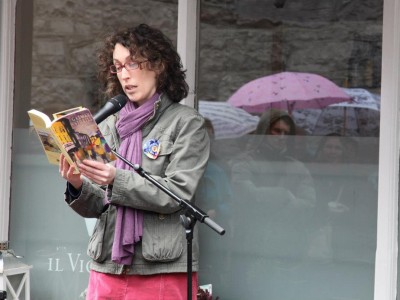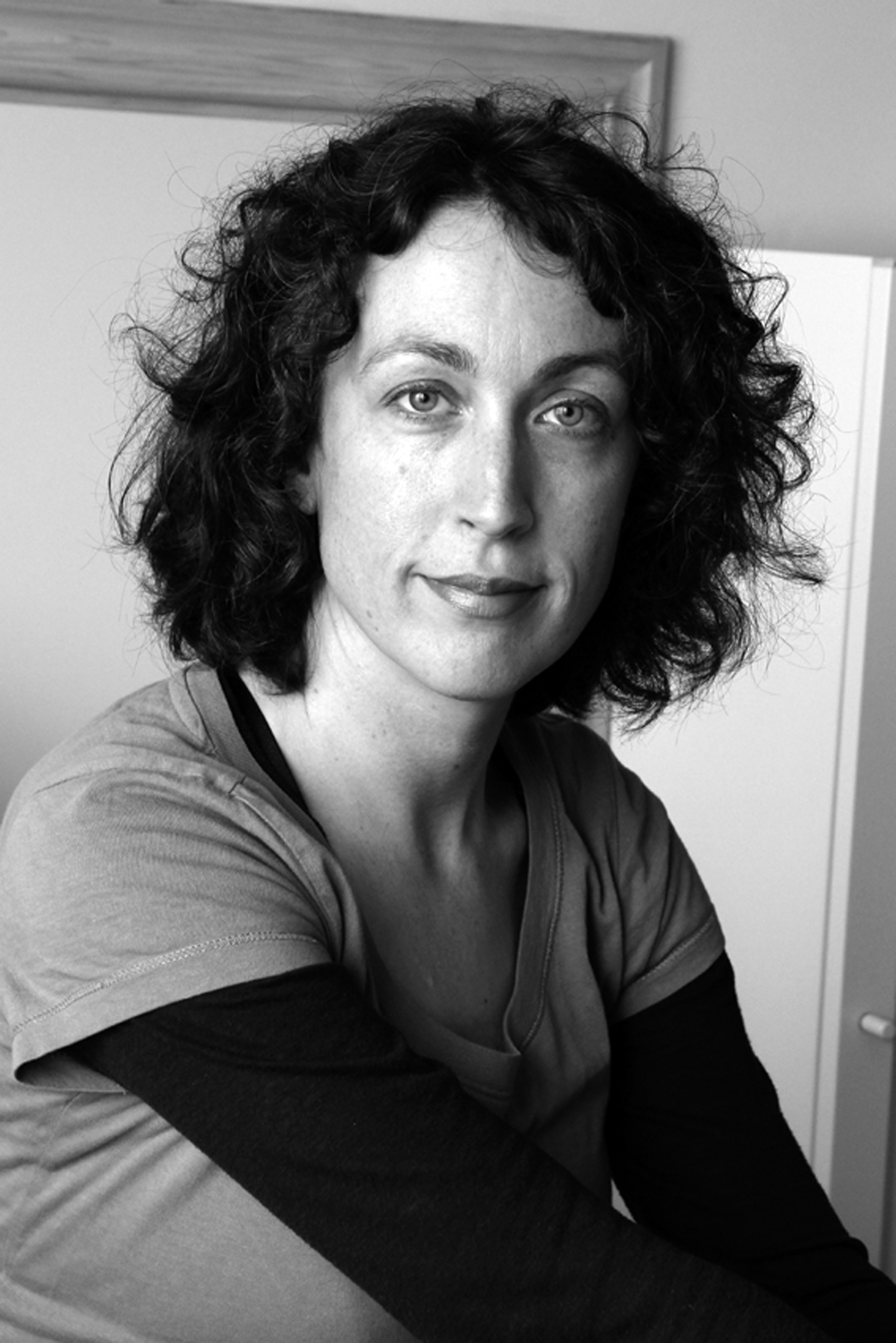[Photo credit: Kevin O’Shea]
Celeste Augé is the author of The Essential Guide to Flight (Salmon Poetry, 2009) and the collection of short stories Fireproof and Other Stories (Doire Press, 2012), which was longlisted for the 2013 Frank O’Connor Award.
The World Literature Review has said that “Celeste Augé’s poems are commendable for their care, deep thought, and intellectual ambition”, while the Anna Livia Review has said that “Fireproof is a remarkably strong debut into the world of short stories and will begin to build what is undoubtedly going to be a strong readership for the author”.
She works in the area of adult education, teaching creative writing to undergraduates at NUI Galway as well as in a community setting. She mentors writers at all stages and in different forms of writing.
Celeste has a Masters degree in writing from NUI Galway. Her poetry has been shortlisted for a Hennessy Award, and she has received a Literature Bursary from the Arts Council of Ireland. In 2011, she won the Cúirt New Writing Prize for fiction. She lives in Connemara, in the West of Ireland.
It has been an honor and delight to have your work be part of the inaugural issue of Penduline. “Ghostgirl” was nominated for a Best of the Net award in 2011. We’ve included a particularly heartbreaking excerpt of it below in which the narrator, Nicola, has become part of the Irish foster care system:
The second family took me in for the summer I turned eight, when Mum went back to your man for more. He only let her stay the summer with him, then turfed her out after she lost her job at the bread factory. I went back to the house with her, but I didn’t say a word. The third and fourth families were for the odd week here and there, they hardly counted. Mum always called them my ‘holidays’. Family number five though, they were a new thing to me. First off, when I walked in the front door, Mrs Shaughnessy reached out, both arms open. As if she wanted to give me a hug. I was twelve years old, way past hugging people I didn’t know. My social worker sort of shook her head, and Mrs Shock let her arms drop, sort of like a deflated balloon. My heart sank. I could just tell it was going to be hard to disappear on this one. See, they have to want you to not be there so you can make yourself invisible. This one was going to be tricky. She wasn’t just a watcher, she was a wanter.
How has “Ghostgirl” been critically received thus far, in Ireland and elsewhere?
‘Ghostgirl’ came out of the time when the Health Service Executive – who are responsible for children in state care in Ireland – had started to publish reports on the deaths of minors in their care. And what came out of that seemed to represent the voices and opinions of everyone involved except the children. Certainly, whenever the death of a minor was reported in the media, they were depicted either as tearaways or victims. I thought that the truth must be neither, that we all have hopes and dreams and possibility, even if we don’t get the opportunity to live them. As far as critical reception goes, there has been little said about the story. I’m not sure why, but then literary discourse in general baffles me.
You attended art school in your twenties. With that in mind, we’re including an excerpt from your short story “Seizures” (from Fireproof and Other Stories, Doire Press)
Colours were the first to change. Carmine flowers, yellow faces, a deep blue wash of stone. She would be filled with a heavy weight, like a gas-filled balloon had entered her chest, swelling slowly. And then the feeling would come, the one she waited for, hoped for. Emotion as melodic as Barber ever wrung out of his ‘Adagio for Strings’ would rush in; a swell of hope that she knew was God’s own love seeded inside of her, and as she gave herself over to this seed she would connect with whatever she touched; if she wandered out into the garden and lay down amongst Gabriel’s Douce Provence peas, she could touch them and feel them grow up and turn to face the sun, and she would feel herself grow towards the sun. If she happened to be in town when the aura started, she would stand in the middle of Shop Street, the shoppers and workers on their lunch breaks washing past her, she would reach out her arms, close her eyes and she would feel their air touching her skin, their heat joining the heat of her body. She considered each aura—episodes, Gabriel called them—a gift from God, a chance to experience the world as He had created it, suffused with love and wonder. And so she re-discovered God, re-claimed him from the faded chants of her convent schoolbooks and Latin masses, long after she had given up on the Church, and replaced the weekly rituals with catching the condom train to Belfast, newspaper deadlines, the calls of her two boys.
Where did you go to art school, and what was the place and the experience like for you? Do you draw today from this background in the visual arts?
I studied Fine Art at the Dublin Institute of Technology. And I dropped out! I have a very visual imagination, and I’ve always found sketching a relaxing and absorbing thing to do, but the BS level in art college was astounding. Some of the lecturers had massive egos that needed an audience, some barely showed up to class, and others worked hard at what they did with little in terms of supplies or support. I remember one lecturer telling me I couldn’t paint because my ego was getting in the way – only to discover (thanks to another lecturer who could actually teach) that I was using the wrong kind of paintbrush.
I don’t consciously draw on my art days. I see things vividly, that’s all. I did learn some useful things in art college, though, that have benefitted my writing: how to question and explore an idea, how to fill a page, how to look for connections, how to balance a composition. I enjoy hanging out with visual artists, and swapping ideas about our different approaches to work. But really, I find that my imagination ultimately craves words. My college notebooks (which were supposed to be a ‘visual diary’) were filled with writing. Even though I dream in pictures, my brain automatically translates them into words.
On your author website’s FAQ page, you advise newbie writers to “find your own teachers. Wherever, whoever, or whatever they may be. Alive or dead, on the page or in your ear. No matter how uncool or unliterary or wildly bizarre they are….And punctuate.” Can you share with us a few real-life examples of your own?
Okay, a brief selection of my writing teachers, in no particular order. Although this batch are all from my childhood.
Comic books – I grew up on Archie comics and the Ducktales comics. That’s where I learnt everything I know about the classics: Ducktales. I also grew up on Peanuts strips. They used to have these two giant compilations of them set out on a desk in the Espanola Public Library. I could have sat there all day. (Given that it was air-conditioned and free, we probably did.)
The Bible, especially the Old Testament. Okay, this comes back to comics, too. My mother bought us a copy of the Bible in comic-form, and I loved the thrill of the stories of Esther and all the rest of the chicks in those books.
My mother and her non-stop storytelling: she takes great joy in turning any minor event into a story, and it’s her joy that makes the stories fun to hear. She also repeats a few standards, depending on the situation, and what kind of story it calls for. I think that’s what I really learnt from my mother: how to make a story relevant to life. That and how to write a shopping list. Which is a handy life skill, let alone how useful it’s been in my writing notebooks.
Mr Caradonna. He was my Grade Five teacher. He used to let us write or draw if we finished our work early, and when he discovered I was writing plays, he got my classmates to perform them when we had free time. You can’t pay for that kind of encouragement.
LM Montgomery and SE Hinton. The best writers with initials. (Sorry, JK.) I re-read their books, still. When I was growing up, I didn’t own a lot of books, but I managed to convince someone to buy me the books these ladies wrote, and read them over and over until the pages started falling out. If I could only read the books of one author for the rest of my life, I’d quite happily choose one of these two.
Imagine you could create a writer’s retreat uniquely your own. Tell us about this retreat…Where would it be? For how long? What facilities or programs would it offer, if any? Who else would you want there? What about sustenance?
Actually, there’s an almost perfect writer’s retreat that I’ve been to a couple of times: The Tyrone Guthrie Centre over in County Monaghan. It’s a fantastically creative place. There is something about working in a place where other writers and artists are also working on creative projects that makes the writing seem easy. There are no formal programs at the Centre, which I like. The Big House hosts a mix of playwrights and poets and novelists – as well as a musician, a dancer, and a visual artist – from around the world. Everyone gathers at 7pm in the dining room around a long wooden table for the main meal of the day – the food is cooked by a fabulous team at the TG Centre – and talks about literature and art and what they’re working on. There is also a cluster of self-catering studios for visual artists, who sometimes join in at meal-times. There is food available in the kitchen throughout the day, someone else does the cleaning, and each writer’s room has a comfy bed, a desk, a dictionary and a view! My favourite room is Lady Guthrie’s. The house even has its own ghost, Miss Worby. There are paths around the woods for walks, a small lake to go boating on or swimming in, solitude and conversation. What more can a writer ask for? Well, the reason I said almost is that the only thing I would change if I could is the weather: a sunny twenty degrees Celsius every day I’m there, please. Then the Tyrone Guthrie Centre really would be perfect.
We’re curious as to whether your creative process for written work is a “toggle” between poetry and prose. Are you able to work on both simultaneously, or do you separate the two? Are there two different Celestes at work, one who crafts poetry, and the other who creates short story collections like Fireproof?Yes, “toggle” describes it perfectly. It isn’t so much that I don’t write poetry while I’m writing fiction, or vice versa, but more that my focus needs to be on one form at a time. Otherwise my poetry starts getting too dilute and my prose becomes so condensed that I forget to tell the reader basic information that they need to know in order to understand the piece. I’ve recently come out of a concerted poetry phase, and I’m noticing that my recent prose is distinctly underdeveloped. But the prose bits and pieces I’ve written during the writing and re-writing of my poetry collection will be used as starting points for other stories. And the same goes with the fragments of poems that will come out of me while I’m focused on fiction. It’ll all get used, in some way, at some point.
Hmm, are there two different Celestes at work? A poetry Celeste and a fiction Celeste? Interesting idea, and difficult to answer. No, I don’t think there are. Ultimately, I’m an ideas-based writer. Something will niggle at me, either an image or an injustice or something someone has said, and there will be a form that best suits the expression of that idea. And that’s the tricky part: figuring out whether it needs the direct punch of a poem, or the wandering exploration of a story. Although, thinking about the notion of poetry-Celeste and fiction-Celeste, it occurs to me that sometimes poetry feels like a more direct expression, that the experience is less mediated, and that it takes a different Celeste to write that kind of thing. But I’m not sure. I don’t feel particularly split, anyway.
Below is an excerpt from your short story, “Floodlands” (from Fireproof and Other Stories, Doire Press):
Sometimes, to stay sane in a place where people forget how it feels to be seventeen years old on the last Saturday in August before you start your Leaving Cert year, you have to go somewhere, anywhere, so you’ll stop shouting at your mother. ‘These are the different types of knives I would use to chop you into pieces, these are the ways I would shut you up,’ you would say if you stayed. So you meet up with Glen, or Barry, or Ciaran, or better still, all three, and you head out in the car Ciaran borrowed from his Mam, an old Toyota Starlet, the bit of sun that makes it past the clouds sparking off the bonnet so you feel like you’re made, all you have to do is crank the window down, take a spin past the old labour house, see if the guy who converted it into a recording studio has any famous guests. See what else the world would bring you, other than old ladies in polyester cardigans and their fellas in Farah slacks.
A number of your stories, like this one, involve young adult protagonists, first-person narratives by people coming of age who are facing adversity. Is there a young adult / older teen contingent to your readership that you are aware of? Do you think that secondary school lit or language arts teachers in Ireland, for example, would be inclined to use your poems or narratives for teaching purposes? If so, what particular stories or poems of yours do you think might find a very good home in the secondary classroom?
I know of one secondary school teacher who uses my story ‘The Good Boat’ in her classroom! But none of my stories have made it onto any state exam syllabus here, and that’s what would usually make a writer aware of it. I’m not sure if the bit of swearing in them would put these stories out of contention though. ‘Mammary World’ could work well in a classroom, as well as ‘Floodlands’ (quoted above).
As for the young adult/older teen readership, someone recently described ‘Fireproof’ as a collection aimed at your inner teenager! And it was then I realised that even the stories that feature elderly protagonists have that element of rebellion or angst that we associate with adolescence. So it’s a book for teenagers of all ages.
Are you working on a new project at the moment?
I have just completed the final draft of my next poetry collection, called ‘Skip Diving’ and due for publication in 2014 with Salmon Poetry. When I say completed, I mean hurled into a corner and sworn at.
I am planning a novel, but I’m not yet ready to start work on it, so at the moment I’m treating myself to some fun writing – whatever whimsy pops into my head, really. From random poems to magical-realism fiction to shopping lists!



![Celeste reading at the Cúirt International Festival of Literature. [Photo: Kevin O'Shea]](http://www.pendulinepress.com/wp-content/uploads/2013/06/Kevin-OShea-Cuirt-reading2013.jpg)

